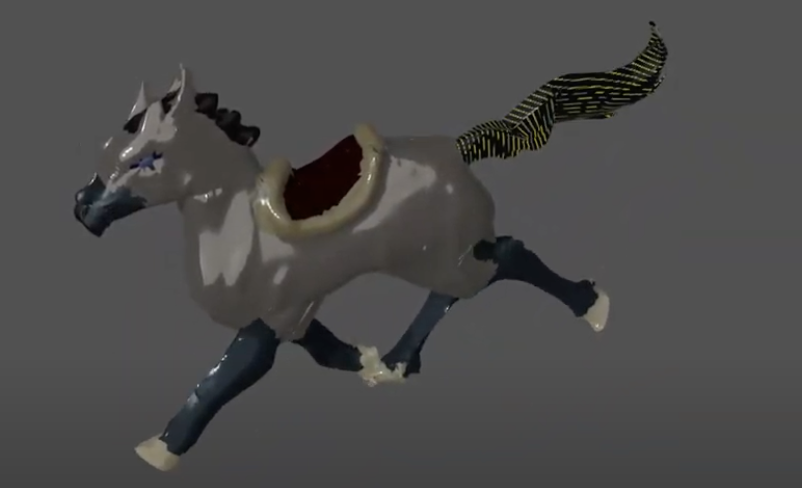With the rapid growth of artificial intelligence, there have been some mixed feelings on how this new technology will affect learning experiences at the University of Georgia.
To provide a fresh perspective on AI, UGA’s Faculty Learning Community: “Innovating with AI: In and Beyond the Classroom” decided to organize the first Generative AI Student Competition last semester. This competition, sponsored by UGA’s Office of Instruction, the Center for Teaching and Learning, and the Provost’s Office, asked students to submit concepts and models for generative AI applications that would enrich experiences for students at UGA.
“The Faculty Learning Community proposed, in light of concerns around generative AI, an idea to take a positive approach to generative AI,” said Aaron Meskin, Professor and Head of Philosophy and one of the co-coordinators of the competition. “We thought the students might have interesting ideas about the positive uses of generative AI.”
“Ultimately, we left it very open to the students to create or do something that impacts the university’s culture and community,” said Lindsey Harding, Director of the Writing Intensive Program and co-coordinator of the competition.
Students across the University got to work bringing their ideas to life using generative AI tools such as Chat GPT and DALL-E. Students submitted ideas as teams and individuals, and ideas ranged from using AI to find new friends on campus based on similar interests, to reimagining class schedules to be more accessible and useful, to organizing methods of using AI as both a writing assistant and tutor.
Reviewing the submissions, UGA faculty and staff judges selected three winners that excelled in their innovation, creativity, and potential impact.
 First place went to Fine-Tuning AI Models to Generate More Accurate Images of Threatened Species in Georgia, a project that used AI to create digital images and build awareness for lesser-known Georgia animals on the endangered species list. Second place went to Mustang Machina, which designed a 3D animated model out of 2D sketches of a speculative, future mode of transportation. And third place was awarded to ZoneOut, a program that works to combine therapeutic journaling with AI-generated music and scenery to help users relax and reflect. The three winners were awarded $500, $300 and $100, respectively, along with some swag.
First place went to Fine-Tuning AI Models to Generate More Accurate Images of Threatened Species in Georgia, a project that used AI to create digital images and build awareness for lesser-known Georgia animals on the endangered species list. Second place went to Mustang Machina, which designed a 3D animated model out of 2D sketches of a speculative, future mode of transportation. And third place was awarded to ZoneOut, a program that works to combine therapeutic journaling with AI-generated music and scenery to help users relax and reflect. The three winners were awarded $500, $300 and $100, respectively, along with some swag.
“The goal of our submission was to fine tune an AI model with multiple images of endangered species in Georgia to highlight the lack of exposure for certain images in our local community,” said Racquel Lynch, a 2024 graduate who majored in Biology with a minor in studio art and member of the team that won the first-place prize. “The numerous creatures involved in our project relay how many species lack representation …, both physically and digitally.”
 Lynch was both a member of the Threatened Species team of eight students and the creator of “Mustang Machina.” She was encouraged to enter the competition by her studio art professor and said she wanted to focus on using generative AI as a tool to raise awareness around important topics and supplement human creativity.
Lynch was both a member of the Threatened Species team of eight students and the creator of “Mustang Machina.” She was encouraged to enter the competition by her studio art professor and said she wanted to focus on using generative AI as a tool to raise awareness around important topics and supplement human creativity.
“Generative AI was created by humans, and on the most basic level, it operates through coexistence with us, our ideas, beliefs, and biases,” Lynch said. “Together, we can use Generative AI beneficially as a lens to recenter the narrative on a variety of issues within today’s society that are often overlooked.”
ZoneOut was created by two students going into their second year at UGA: Josh Achiu, who is in the School of Computing, and Lauren Trimble, an intended psychology and criminal justice major. Achiu said they designed their project around the idea of creating something beneficial for students’ mental wellbeing.

“Lauren and I wanted to make something that could perhaps address mental health and wellbeing concerns that we have both seen experienced by students on our campus,” Achiu said. “I believe generative AI programs like ZoneOut could benefit users in the way that they’re able to create personalized output that could be supplemental to other types of therapy.”
“I believe that the most positive outcome for any AI software or tool stems from the consideration of the people who use it,” Achiu added. “Once we start to think of AI as a human-based tool that requires ethical consideration at the forefront, we can begin to inspire true positivity and advancement in the world of AI.”
As generative AI and the sentiment around the technology grow, Harding and Meskin said it will be interesting to see how student projects grow and evolve as well. Harding and Meskin agreed that the competition, and AI overall, is a call to reflect on our work in the classroom and the workplace.
“I think about AI as a way to promote critical reflection of the work we’re doing,” Harding said. “Sometimes, it’s a nice collaborator to keep moving forward with something we’re working on. It’s not about AI being net good or net bad, but more about what it does well and not as well.”
In the spirit of AI, I thought I’d give Microsoft Copilot a try to write an introduction for this story. Copilot was a little too … extravagant. – Wes Mayer
(June 6, 2024) Microsoft, Copilot – Prompt: Write a lede for a story about a Generative AI student competition highlighting the beneficial uses of Generative AI.
“Igniting the Future: (UGA’s) Generative AI Student Innovation Competition Showcases the Transformative Power of AI
“In a bustling arena of creativity and intellect, students from diverse backgrounds converge to explore the boundless potential of generative AI. The competition serves as a catalyst, fueling an entrepreneurial spirit and pushing the boundaries of sophisticated technologies.”
Hmmm…
Prompt: Write one line about a college-level generative ai competition
“In the hallowed halls of academia, minds converge and algorithms ignite: the annual Generative AI Student Competition pushes boundaries, sparking innovation and reshaping the future.”
…Hallowed halls of academia? It is clear that there is still some need for human judgment.
